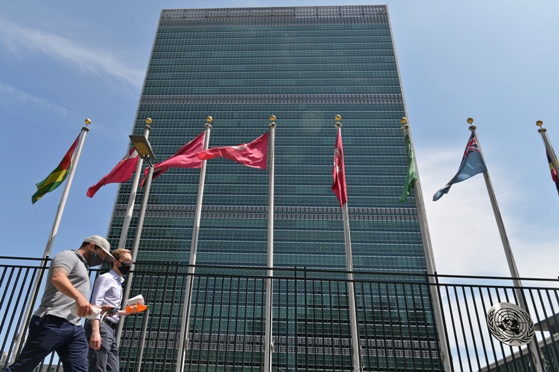Climate, COVID and Biden’s challenged credibility underline UN’s big week
By Rick Gladstone
NEW YORK — The United Nations on Tuesday (21) convenes its annual speeches by world leaders against a backdrop of seemingly irreversible planet warming, polarized superpower relations and a tenacious pandemic that has worsened the global rich-poor divide.
The weeklong meeting of the General Assembly, the world’s biggest diplomatic convocation, also amounts to a major test of credibility for President Joe Biden, who will be among the first to address the 193-member body.
Despite his avowed enthusiasm for the United Nations — a marked departure from his predecessor, Donald Trump — Biden will be making his debut speech as president amid strong new doubts about his ability to vault the United States back into a position of global leadership after Trump’s fractious tenure and promotion of ‘America First’ isolationism.
Here is a look at what to expect this week at the General Assembly, its 76th annual session since the United Nations was founded at the end of World War II:
What’s different this year?
Unlike 2020, when the session was conducted almost entirely virtually because of the pandemic, more than 100 leaders and other high-ranking representatives intend to deliver their speeches in person. But access to the 16-acre UN complex in Manhattan remains strictly limited, with mandatory mask-wearing and other COVID-prevention measures. US Ambassador Linda Thomas-Greenfield told reporters that the measures were meant to ensure that the General Assembly “does not become a superspreader event.”
Confusion erupted last week over a New York City requirement that all General Assembly participants show proof of vaccination. This year’s president of the General Assembly, Maldivian Foreign Minister Abdulla Shahid, endorsed the requirement. But exactly how it will be enforced is unclear. UN officials have said that the organization’s own headquarters staff must be vaccinated but that an honour system remains in place for visiting VIPs and other guests.
Why is this General Assembly a test for Biden?
The world is eager to hear Biden’s priorities and his vision for the global role of the United States, the biggest single financial contributor to the United Nations. But he will be speaking in the context of a spate of negative news that has buffeted his administration less than a year into its term.
Biden has so far failed to contain the COVID pandemic at home, and his efforts to help provide vaccines to other struggling areas of the world have done little to mitigate the yawning discrepancy in vaccination rates between wealthy and poor countries.
His UN appearance also comes less than a month after the chaotic US exit from the 20-year military engagement in Afghanistan. The hastily organized withdrawal created a new wave of asylum-seekers, emboldened the Taliban and re-created a possible haven for terrorist groups.
And last week, Biden blindsided France, the oldest US ally, in a secret arms deal with Australia that left one of the biggest French military contracts in ruins and created new doubts about his administration’s honesty with long-standing US partners.
Who else is speaking in person?
The most prominent leaders speaking in person — just on the first day — include Brazilian President Jair Bolsonaro, an avowed COVID sceptic whose own mismanagement of the pandemic threatens his political future. He will be the first head of state to address the gathering and has created a stir by vowing to defy the vaccination requirement.
Among the other first-day speakers are the presidents of Turkey, Mexico, Poland and the Congo.
Who determines the speaker order, and why does Brazil go first?
UN protocol officials say Brazil has by tradition spoken first since the mid-1950s because, at the time, no other country’s leader was willing to do so. That position is now considered a coveted slot that can help set the tone of the week.
The order of speakers generally adheres to the principle that the leader of the host country goes second, followed by other heads of state, heads of government, vice presidents, crown princes, foreign ministers, then deputies and ambassadors. The order is also determined by the date when each of the 193 members makes the request.
Who is skipping?
Many leaders have opted to use pre-recorded video, as was done last year, or to have a lower-ranking representative speak in person. Still, the absence of a particular country’s leader this year can send a message.
Perhaps the most prominent leader to skip the General Assembly is President Xi Jinping of China, an increasingly important financial contributor to the United Nations and a rival with the United States for influence there, an underlying source of tension.
Russian President Vladimir Putin will not attend either. Xi and Putin are sending subordinates instead.
In what may be another sign of France’s anger at the United States, French President Emmanuel Macron has abandoned the idea of speaking even by video, ordering his foreign minister, Jean-Yves LeDrian, to speak instead, which now could happen on the final day.
Iran’s new president, Ebrahim Raisi, also sent a pre-recorded speech, skipping the opportunity for personal diplomacy that could help save Iran’s near-moribund nuclear deal with major powers.
What will they be talking about?
Perhaps the most important topic will be climate change, with new scientific evidence showing a losing battle in what UN Secretary-General António Guterres has called an existential struggle.
British Prime Minister Boris Johnson, who will be hosting an UN-led climate change conference in Scotland in two months, co-led a preparatory meeting with Guterres on Monday (20).
Battling the pandemic also is expected to dominate the week. Biden planned to host a COVID summit on the sidelines. Other topics to be discussed include the Taliban takeover in Afghanistan, the 7-month-old military coup in Myanmar, the endangered Iran nuclear deal, the political vacuum in Haiti, and the conflicts in Ethiopia, Yemen and Syria.
-New York Times


